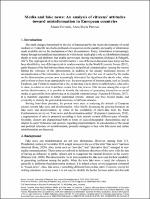Chapter Media and fake news: An analysis of citizens’ attitudes toward misinformation in European countries
Author(s)
Ferrante, Mauro
Parroco, Anna Maria
Language
EnglishAbstract
The rapid changes determined by the rise of Internet and the recent development of social media in daily life have led to profound consequences on the quantity and quality of data made available and on the mechanisms of their dissemination. The rapid spread of on-line disinformation is one of the most discussed topic, and has been identified as one of the top-trends in modern societies by the World Economic Forum, also because of the link between these processes and political communication. Thanks to the availability of micro-data from the Flash Eurobarometer survey on “Fake news and disinformation online”, the present work aims at analyzing the attitude of European citizens toward fake news and disinformation. In a first step, cluster of citizens are identified according to their level of trust in media news, in relation to different types of media. Given the categorical nature of the variables considered, k-mode clustering is implemented. Secondly, the main determinants of news trust levels are analyzed, through regression models for categorical response variables. Preliminary results show that socio-demographic characteristics as well as technological use have an influence on trust in the media, which in turn determines different approaches on the role of institutions in tackling disinformation. The relevance of fake news in contemporary period and its potential consequences on the political side require a reflection on the role of statistical literacy and of official statistical institutes in dealing with disinformation in the post-truth era.


 Download
Download Web Shop
Web Shop